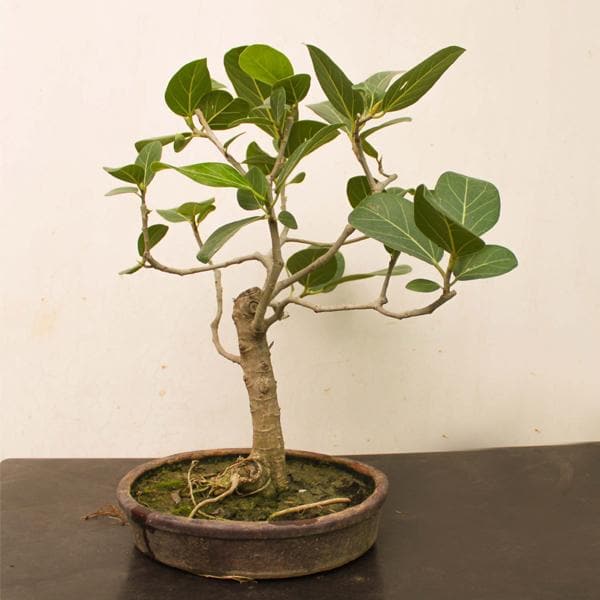Description
Ficus trees are a common plant in the home and office, mainly due to the fact that they look like a typical tree with a single trunk and a spreading canopy.
Ficus is a pan-tropical genus of trees, shrubs and vines occupying a wide variety of ecological niches; most are evergreen, but some deciduous species are endemic to areas outside of the tropics and to higher elevations.
Fig species are characterized by their unique inflorescence and distinctive pollination syndrome, which utilizes wasp species belonging to the Agaonidae family for pollination.The always popular ficus tree is a member of the fig family and perfect for caring for as a houseplant. There are several varieties of this plant that are grown as houseplants. Among these are the ficus benjamina or weeping fig, the ficus lyrata or fiddle head fig, and the ficus elastica decora or rubber tree.Ficus plants range from large trees to woody shrubs to trailing vines. The ficus comes in many shapes and sizes that make this a popular focal point in your home.Ficus (genus Ficus), a group of about 900 species of trees, shrubs, and vines, commonly called figs. Native primarily to tropical areas of East Asia, they are distributed throughout the worlds tropics. Many are tall forest trees that are buttressed by great spreading roots; others are planted as ornamentals.The always popular ficus tree is a member of the fig family and perfect for caring for as a houseplant. There are several varieties of this plant that are grown as houseplants. Among these are the ficus benjamina or weeping fig, the ficus lyrata or fiddle head fig, and the ficus elastica decora or rubber tree. The Bodhi tree, under which the Buddha achieved enlightenment, is believed by many to have been a ficus religiosa. The most popular as an indoor tree is the ficus benjamina.Plant Specifications
| Common Name | Ficus |
| Maximum Reachable Height | upto 2 feet |
| Bloom Time | The flowers are inconspicuous and the plants are grown mainly for their foliage |
| Difficulty Level | easy to medium |
Planting and care
Cold drafts from windows or doors will harm them, so make sure to place them somewhere where drafts will not be an issue.Losing its leaves is the most common problems with ficus plants. Leaf drop is a ficus trees standard reaction to stress, whether its from any of the following:Under watering or over watering, Low humidity, Too little light, Relocation or repotting, Drafts, Range in temperature (too hot or cold).If your ficus is losing its leaves, go through the checklist of proper ficus tree care and correct anything that you find wrong.
Banyan tree Bonsai care
| Sunlight | Most ficus trees enjoy bright indirect or filtered light with variegated varieties happily able to take medium light. Bright, direct light may result in scalding of the leaves and leaf loss. |
| Watering | When watering, always check the top of the soil first. If the top of the soil is wet, do not water as this means they have enough moisture. If the top of the soil feels dry to the touch, this indicates that they need water. |
| Soil | Rich, humusy and well-drained soil. |
| Temperature | Ficus trees also cannot tolerate low temperatures or drafts. They need to be kept in temperatures above 60 F. (16 C.) and actually prefer temperatures above 70 F. (21 C.). |
| Fertilizer | Feed with slow-release pellets in the beginning of the growing season. Fertilize once a month in the spring and summer and once every two months in the fall and winter. |
Banyan tree Bonsai special feature
Most ficus bonsai trees can produce aerial roots in their natural habitat, which are often presented in appealing bonsai creations with many aerial root pillars or root over rock styles. To enable aerial root growth in our homes a humidity of nearly 100% must be achieved artificially.
You can use a glass cover, fish tank or a construction with transparent sheets for this purpose.
The Bodhi tree, under which the Buddha achieved enlightenment, is believed by many to have been a ficus religiosa.
Fig species are characterized by their unique inflorescence and distinctive pollination syndrome, which utilizes wasp species belonging to the Agaonidae family for pollination.
Banyan tree Bonsai uses
Ornamental Use:
- Ficus trees can maintain their tree-like shape regardless of their size, so this makes them ideal for bonsais or for massive houseplants in large spaces
- The plant is used for ornamental purpose
- Its generally keep indoor in living room and in terrace area
Culinary Use:
- The common fig (Ficus carica) is cultivated for its pear-shaped, edible fruits, which are really hollow fleshy receptacles (syconia) containing hundreds of male and female flowers



Comment